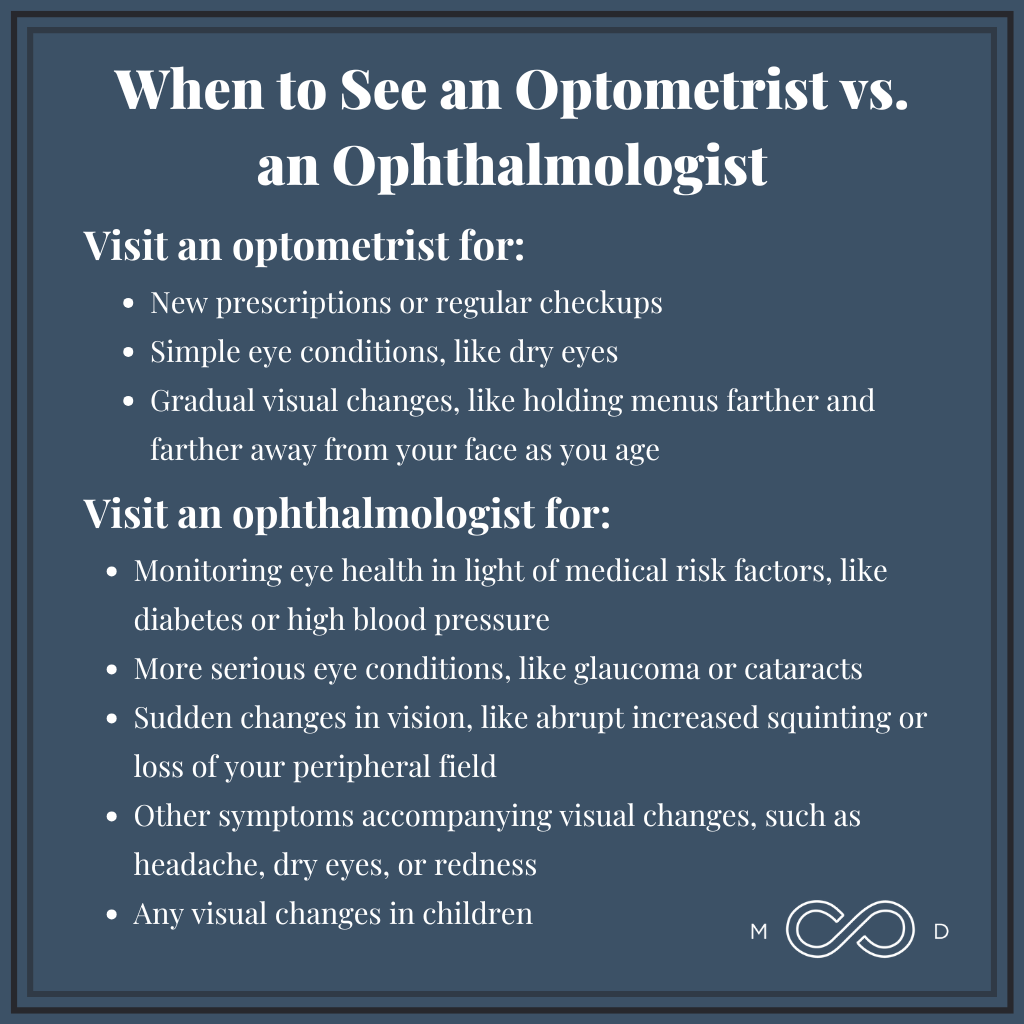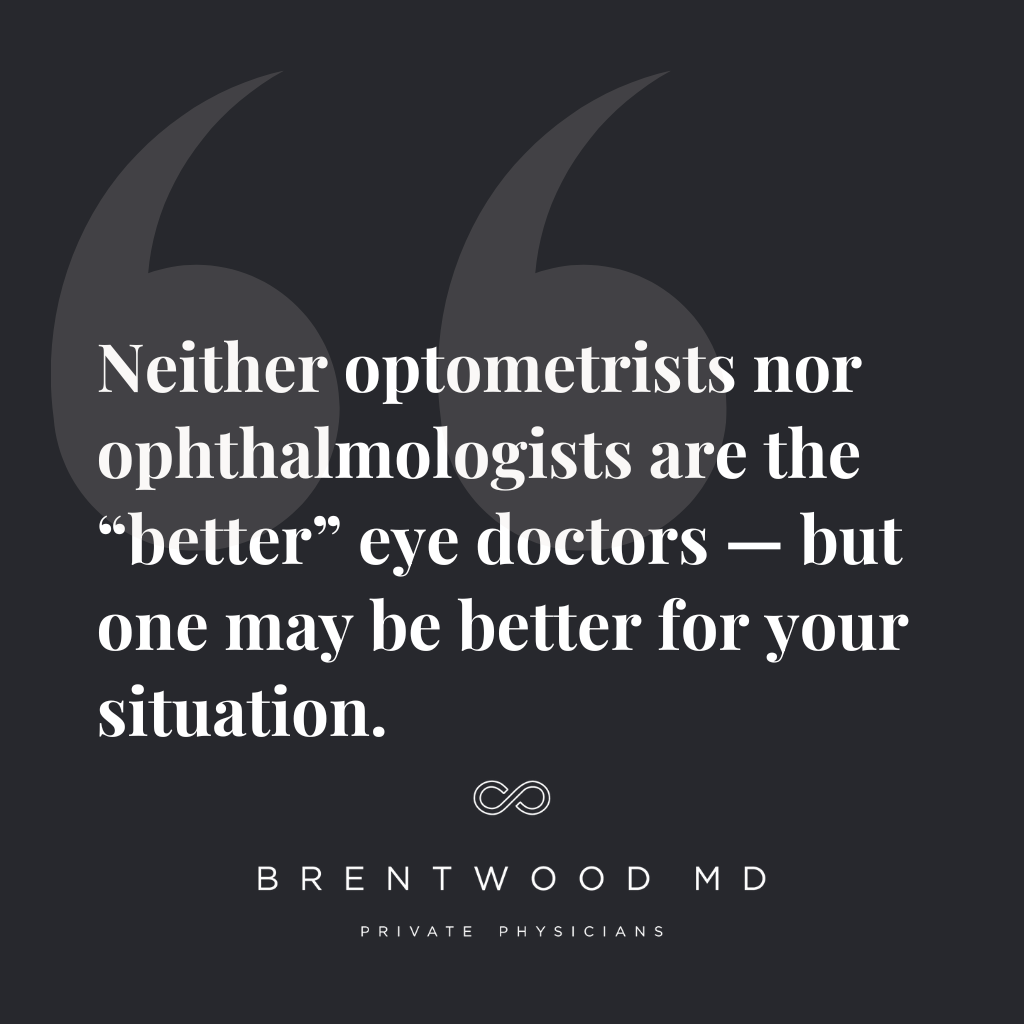When was the last time you went to the eye doctor? Did you go to an optometrist or an ophthalmologist? What’s the difference?
The term “eye doctor,” while accurate, covers two distinct specialties with very different scopes of practice. The truth, however, is that many people — even medical professionals — don’t know the difference between an optometrist and an ophthalmologist, or when to see which.
To help you make informed decisions about your eye care, let’s clear up the confusion around optometrists vs. ophthalmologists and discuss the types of situations best suited to each specialty.
Optometrists vs. Ophthalmologists: Key Differences
First, it’s important to note that neither specialist is “better” than the other. Both optometrists and ophthalmologists play important roles in caring for eye health. Though the two have some overlap, they specialize in different aspects of care.
The main differences between optometrists vs. ophthalmologists come down to their education, training, and scope of practice.
Optometrists are doctors of optometry (OD) who complete four years of specialized training after their undergraduate degree. Their expertise is in vision care, including prescribing glasses or contact lenses and diagnosing common eye conditions like dry eyes or glaucoma. Think of optometrists as the “primary care” providers of eye health.
Optometrists are your go-to professionals for:
- Routine eye exams
- Prescribing glasses or contact lenses
- Managing common conditions like dry eyes
Ophthalmologists are medical doctors (MDs) who specialize in eye care. Following undergraduate studies, they then go through medical school, followed by several years of residency in eye-related diseases and surgery. During their education, they gain broad medical knowledge before specializing in eye care, giving them a comprehensive understanding of how various health conditions affect vision.
Ophthalmologists are appropriate choices for:
- Surgical treatments
- Management of complex conditions like cataracts and macular degeneration
- Specialized monitoring and care for patients with medical conditions affecting vision, such as diabetes and hypertension
When to See an Optometrist vs. an Ophthalmologist
Since the vast majority of people don’t know the difference between an optometrist and an ophthalmologist, they may end up wasting time and money seeing the wrong doctor initially.
I’ve done this myself. When I began noticing gradual changes in my vision, I made an appointment with an ophthalmologist. The result? I didn’t have any underlying risk factors that affect vision or any sudden vision changes to cause alarm. It turned out that all I needed was a new pair of glasses.
While an ophthalmologist is certainly capable of prescribing glasses, the wait to see them is typically longer, and they’re often more expensive. So if you don’t need to see an ophthalmologist, visiting the optometrist is a far better option. If, however, you have a more complex vision issue or risk factors like high blood pressure or diabetes, an optometrist isn’t adequate for your needs.
As a concierge physician, I recommend discussing your eye and vision issues with your primary care doctor to help you decide between an optometrist vs. an ophthalmologist. We’re trained to take into account your full range of symptoms and medical history to make the best recommendation. Consider the following general guidelines to start with.
Visit an optometrist for:
- New prescriptions or regular checkups
- Simple eye conditions, like dry eyes
- Gradual visual changes, like holding menus farther and farther away from your face as you age
Visit an ophthalmologist for:
- Monitoring eye health in light of medical risk factors, like diabetes or high blood pressure
- More serious eye conditions, like glaucoma or cataracts
- Sudden changes in vision, like abrupt increased squinting or loss of your peripheral field
- Other symptoms accompanying visual changes, such as headache, dry eyes, or redness
- Any visual changes in children
It’s not uncommon for an optometrist to refer you to an ophthalmologist if they spot something concerning during a routine eye exam. Similarly, an ophthalmologist may refer you back to an optometrist for follow-up care or for managing less complex issues once the major problem has been treated.
Again, neither optometrists nor ophthalmologists are the “better” eye doctors — but one may be better for your situation. The key is to get the right care from the right doctor at the right time.
When Unsure About Which to See, Ask Your Primary Care Physician.
One of my favorite elements of becoming a concierge physician is having the time and energy to consider my patients’ whole medical picture. In the realm of vision care, this means I can effectively guide them to the eye doctor that’s most appropriate for their needs.
Whether you need an optometrist vs. an ophthalmologist depends on your unique situation. The best first step? Pay attention to how quickly your vision changes and any accompanying symptoms like eye redness or dryness. Then, have a conversation with your primary care doctor about your eye health and any changes you’ve noticed.
Together, you can ensure you’re getting the right care from the right eye care professional at the right time.

Dr. Wright joined Brentwood MD in 2022 as the model allows him to spend more time connecting with patients and build a foundation of exceptional care. He is a Nashville native and completed his family medicine residency at the University of Tennessee Health Science Center, where he also served as Chief Resident. He believes that your health deserves a prominent position on your priority list, and would be honored to serve you and your family.









